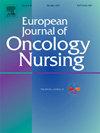伊朗癌症妇女丈夫的抑郁、焦虑、压力及相关因素:横断面研究
IF 2.7
3区 医学
Q1 NURSING
引用次数: 0
摘要
目的 本研究旨在确定癌症女性患者丈夫的抑郁、焦虑和压力患病率及其相关因素。方法 本横断面研究纳入了 2022 年 4 月至 8 月期间转诊至伊朗伊斯法罕卡尚市两家癌症转诊中心的 400 名癌症女性患者的丈夫。结果丈夫的平均年龄为(50.47 ± 10.16)岁,抑郁、焦虑和压力的患病率分别为 15%、17.5% 和 17.8%。多元回归分析表明,丈夫的抑郁与年龄、照顾妻子的参与率、性满意度和教育程度之间存在明显的关联(p < 0.05)。焦虑率也与教育水平、经济状况、住房状况、照顾妻子的参与率、性满意度、妇女患癌时间、癌症进展程度以及因癌症住院的时间长短有关(p <0.05)。压力率与年龄、受教育程度、参与照顾妻子的程度和癌症病程也有显著相关性(p <0.05)。因此,根据已确定的与这些并发症相关的因素,医护人员可设计支持性护理计划,以改善癌症患者丈夫的心理健康,减轻他们的痛苦。本文章由计算机程序翻译,如有差异,请以英文原文为准。
Depression, anxiety, stress and related factors among husbands of Iranian women with cancer: A cross-sectional study
Purpose
The aim of this study was to determine the prevalence of depression, anxiety, and stress and their related factors in husbands of women with cancer.
Methods
This cross-sectional study included 400 husbands of women with cancer who referred to two cancer referral centers in Kashan (Isfahan, Iran) from April to August 2022. The demographic and medical data, the Larson Satisfaction Questionnaire (LSQ), and the Depression, Anxiety, Stress Scale-21 (DASS-21) were collected.
Results
The mean age of the husbands was 50.47 ± 10.16 years, and the prevalence of depression, anxiety, and stress was 15%, 17.5%, and 17.8%, respectively. Multiple regression analysis revealed significant associations between husbands' depression and age, involvement rate in caring for their wife, sexual satisfaction, and education level (p < 0.05). The rate of anxiety was also related to education level, economic status, housing status, the rate of involvement in caring for one's wife, sexual satisfaction, the duration of the woman's cancer, the degree of cancer progression, and the length of hospitalization due to cancer (p < 0.05). The stress rate also showed a significant correlation with age, educational level, degree of involvement in caring for one's wife, and duration of cancer (p < 0.05).
Conclusion
The prevalence of psychological problems among husbands of women with cancer is remarkable. Therefore, based on the identified factors associated with these complications, supportive care programs can designed by health care professionals to improve mental health and reduce the suffering of husbands of patients with cancer.
求助全文
通过发布文献求助,成功后即可免费获取论文全文。
去求助
来源期刊
CiteScore
4.40
自引率
3.60%
发文量
109
审稿时长
57 days
期刊介绍:
The European Journal of Oncology Nursing is an international journal which publishes research of direct relevance to patient care, nurse education, management and policy development. EJON is proud to be the official journal of the European Oncology Nursing Society.
The journal publishes the following types of papers:
• Original research articles
• Review articles

 求助内容:
求助内容: 应助结果提醒方式:
应助结果提醒方式:


